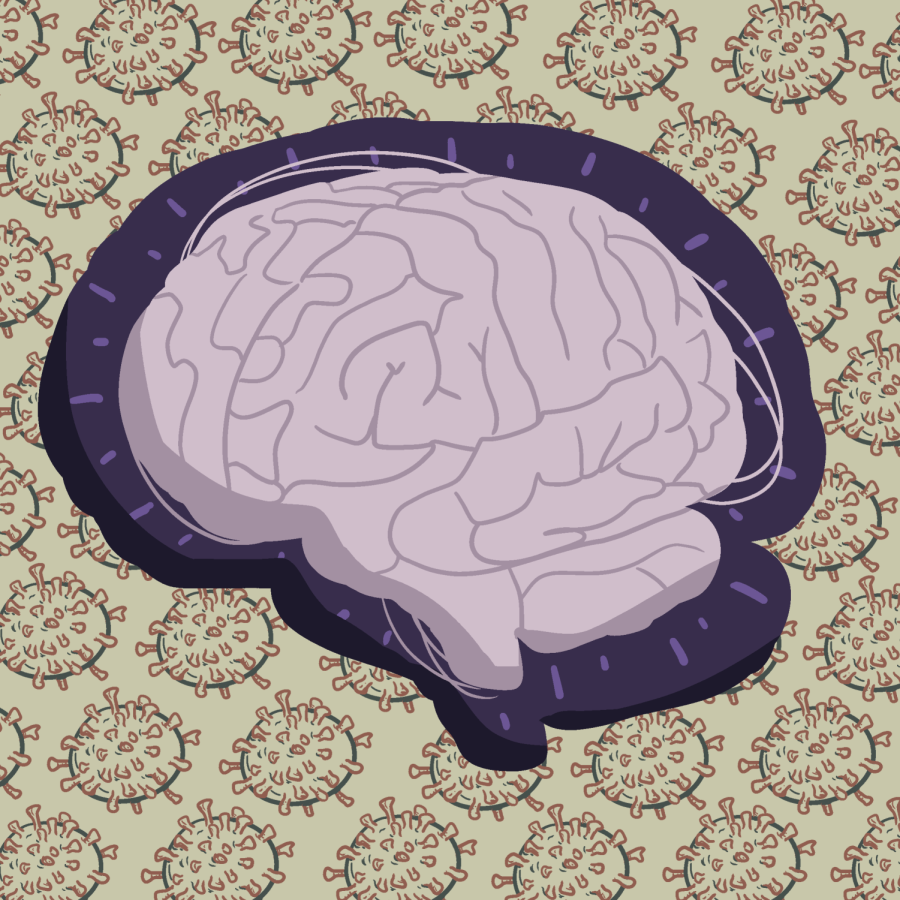UT researchers study ‘COVID brain,’ why patients experience brain fog, depression, and other lingering symptoms post-infection
April 28, 2022
Some individuals who contract COVID-19 struggle with “long COVID,” experiencing lingering acute COVID-19 symptoms such as fatigue and shortness of breath, in addition to other symptoms like depression and personality change.
Shelli Kesler, an associate professor of nursing, is trying to determine why patients experience cognitive difficulties, or “COVID brain,” after infection in her third study looking at the effects of the virus on the brain. The results may predict who is at the highest risk for long-term cognitive effects and help guide interventions for COVID-related cognitive effects, Kesler said in an email.
Kesler’s previous research looked at how chemo affects the brain, a phenomenon known as “chemo brain,” which afflicts 30-60% of cancer patients, leaving cognitive difficulties following chemotherapy that can last decades, Kesler said.
“Both chemo brain and COVID brain refer to decline in brain health following a disease that does not originate in the brain,” Kesler said. “Both likely share some similar mechanisms such as inflammation. When inflammation is chronic, it is toxic to brain cells.”
Michael Brode, assistant professor in the Department of Internal Medicine at Dell Medical School and medical director of the post-COVID-19 program at UT Health Austin, said post-viral illness symptoms are phenomena observed in previous pandemics, like the 1889-90 Russian flu pandemic or the 1918 Spanish flu.
“There is a little bit of a billion-dollar question: What is just post-viral or post-infectious (and) what is specific to COVID-19?” Brode said. “The answer is: There’s probably going to be a little bit of both. We are seeing that most people are getting better, (but) usually, it’s slow. In other post-viral or post-infectious illnesses, sometimes their recovery can be one to three years or sometimes two to five years.”
Younger individuals may be more vulnerable to COVID brain, which is known to most severely affect executive function, Kesler said. Kesler’s previous research found that 40% of people who contracted mild to severe COVID-19 experienced cognitive issues averaging four months after infection, most severely affecting 28 to 33-year-olds. Another study of Kesler’s determined that patients who were not hospitalized faced the same rate of impairment as those who were.
“It could relate to differences in coping mechanisms among younger individuals compared to older individuals,” Kesler said. “Younger people use more socially based coping mechanisms and the pandemic resulted in a lot of social isolation. Also, younger adults tend to be at a critical crossroads in their lives in terms of seeking higher education, beginning their careers and becoming independent, so they can be more vulnerable at this stage.”
COVID-19 can travel along nerve pathways and enter the brain through the nose by the olfactory nerve, which is connected to the prefrontal cortex, Kesler said. It can also cause oxygen deprivation and destroy brain cells or cause neuroinflammation and reduced blood-brain barrier integrity, which is essential for neuronal function.
UT’s post-COVID-19 program offers clinical services to patients dealing with long COVID by integrating mental health care and developing therapeutic treatments based on findings by researchers like Kesler, Brode said.
Patients with long COVID may benefit from short-term use of antidepressants or stimulants, integrating strategies like note taking and smartphone reminders to compensate for brain fog, and applying for accommodations through work or school, Kesler said.
“Unfortunately, very few studies have been done to date so we don’t know as much as we would like,” Kesler said. “It is possible that the brain functions less efficiently following COVID due to altered connectivity. This is what our study will help determine.”



